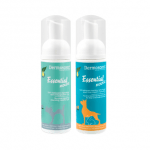
The snow, ice, and cold temperatures of winter bring a set of challenges for our animals. Despite their layer of fur for protection, dogs and cats can experience dry, uncomfortable skin. Indoor heating can dry out the air and circulate allergens throughout your home. Cold weather and frozen surfaces can cause frostbite. In fact, winter skin and coat problems are a common concern. Just as you may take extra steps to keep yourself healthy when the weather turns cool, we’ve put together some tips for your pets too. We’ve also featured a few Dermoscent skin care products below.
Humidity
Make sure your home is comfortable for you and your pets all winter long by controlling the humidity levels. If you have forced air or a central furnace system, it will emit dry heat throughout your home. This low-humidity environment quickly dries out the skin and nasal passages and causes static electricity shocks. To combat dry air, try using a humidifier and fixing cold air drafts.
Winter Allergies
Allergies are more common during the warmer months when pollens, grasses, and bugs are more plentiful. Dust mites and mold are common indoor allergens that trigger reactions in people and pets. Continual scratching caused by allergies and irritants can cause dry skin to become damaged and prone to infection. While they cannot survive freezing temperatures outdoors, fleas can thrive indoors during winter. Consider using preventatives all year long to keep your pet from being bitten.
Diet & Nutrition
If your dog or cat’s skin is easily irritated during winter, talk to your veterinarian about your pet’s current diet or incorporating supplements. Poor nutrition, including low levels of dietary protein and essential fatty acids, can also cause a dull hair coat.
Grooming & Bathing
In the winter, reduce the number of baths you give to your dog or cat. Soaps and shampoos can strip the natural skin oils and dry it out, causing flaky, itchy skin. Instead, try a moisturizing or waterless shampoo. You may also try bathing wipes for spot cleaning. Regular brushing encourages blood circulation and distributes oils to help moisturize the skin and hair coat.
Exposed Skin
Dogs and cats grow their own winter coat, but this does not mean they are always protected from frostbite and skin injury. Frozen surfaces The most vulnerable areas to frostbite are on paw pads, ears, and tail. Learn more about the signs of frostbite. Monitor weather conditions closely and limit your pet’s time outdoors, especially during wind chill, extreme cold, and winter weather warnings. Snow and ice can cut paws, so before going for walks, keep paw pads hydrated and protected with a spray or balm. When you return home, wash their paws to remove any potentially toxic or irritating substances like salt, ice melt products, and antifreeze.
VetRxDirect offers a variety of products to meet your pet’s skincare needs through every season. Check out these products from Dermoscent, and visit our website for more information.
Dermoscent Dermatology Products For Winter
Dermoscent Essential 6 Spot On is a topical treatment of omega essential fatty acids, natural essential oils, and Vitamin E to moisturize and regulate the skin. It helps reduce dandruff, deodorize, regulate dryness and greasiness, control shedding, and protect skin. Essential 6 also helps maintain healthy skin and reinforces the skin barrier for dogs and cats prone to allergies.
 Dermoscent Essential Mousse is a soap-free, rinse-free foaming cleanser for dogs and cats. This pH-balanced, gentle formula cleans dirt and dandruff and deodorizes with soothing natural ingredients. It contains essential fatty acids which moisturize dry, sensitive skin and nourish the haircoat. This waterless cleanser helps extend the time between bathing and is ideal for quick clean ups.
Dermoscent Essential Mousse is a soap-free, rinse-free foaming cleanser for dogs and cats. This pH-balanced, gentle formula cleans dirt and dandruff and deodorizes with soothing natural ingredients. It contains essential fatty acids which moisturize dry, sensitive skin and nourish the haircoat. This waterless cleanser helps extend the time between bathing and is ideal for quick clean ups.
 BioBalm is designed to nourish your dog’s dry skin. It moisturizes and protects exposed skin areas including the paws, nose, and elbows. It helps prevent cracking, chapped, dry, and thickened skin. Ideal for calluses and soothing irritation between the toes. Bio-Balm is water resistant making it ideal for winter skin hydration and for protecting the paws.
BioBalm is designed to nourish your dog’s dry skin. It moisturizes and protects exposed skin areas including the paws, nose, and elbows. It helps prevent cracking, chapped, dry, and thickened skin. Ideal for calluses and soothing irritation between the toes. Bio-Balm is water resistant making it ideal for winter skin hydration and for protecting the paws.
How do you keep your pet healthy and happy during the winter? Leave us a comment below!




 O3 Omega features high potency essential fatty acids EPA and DHA from wild-caught fish oil. It includes vitamins A, D, and E. It helps promote healthy skin and coat as well as immune and joint health. Giving O3 Omega to your dog or cat is easier since it comes in a variety of options including capsules, clip tips, liquid, soft chews, and mini bites.
O3 Omega features high potency essential fatty acids EPA and DHA from wild-caught fish oil. It includes vitamins A, D, and E. It helps promote healthy skin and coat as well as immune and joint health. Giving O3 Omega to your dog or cat is easier since it comes in a variety of options including capsules, clip tips, liquid, soft chews, and mini bites.
